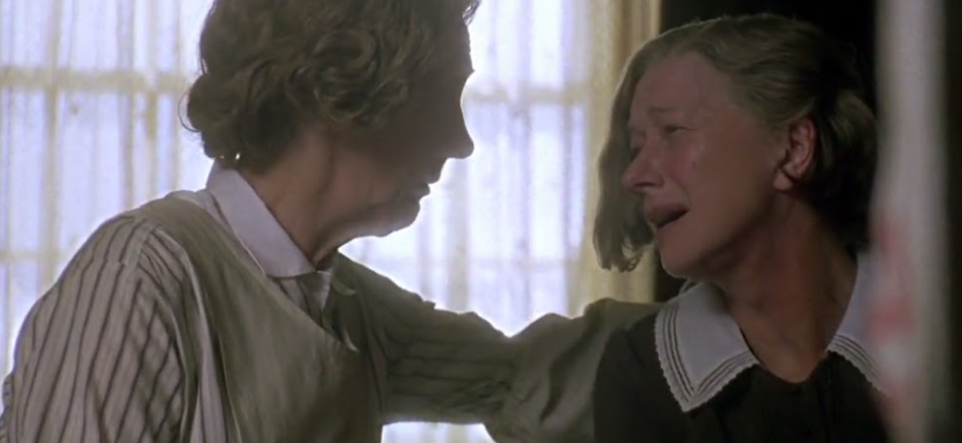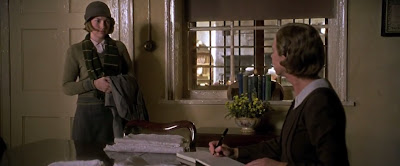Editor's Note: I am pleased to announce that Andrew Kendall of Encore's World has joined "Team Experience". Here is his first post, looking back on a truly fine performance in Best Picture nominated Gosford Park (2000) - Nathaniel R
I would not say that finding a monologue (or monologue adjacent) scenes for Monday Monologues is an impossibility, although it can get somewhat difficult when so many films seems to revel in single sentence conversations and the like. Finding a monologue in an ensemble film, though, is particularly daunting. For with ensemble films, at least in theory, no one character takes precedence and as far as ensembles of the last three decades are concerned I would rank Gosford Park near the top. Maggie Smith, Clive Owen, Emily Watson, Bob Balaban, Kristin Scott Thomas, and even Ryan Philippe all battle for my top honours depending on the scene even as the “resolution” of the film rests on a scene between two of the quieter characters of the film.
More often than not cinematic monologues tend to take on the role of a confessional – the character is bursting over with something, a secret, a regret, a plan – and it needs to be expelled. [more] Mrs. Wilson’s confession of the murder of caddish Sir William McCordle is a fine example of a movie confession existing as monologue. What’s particularly fantastic about this scene in Gosford Park is that technically it is really just a scene of exposition at the end of a mystery, one which is necessary for the plot but might not appear to be essential to the film’s nature. Even its placement, just before the end, reeks of something ungracefully shoehorned into the film. But Fellowes choice dialogue and Mirren’s delivery make it seem less inauthentic than it might have. For, in this scene, we see the reserved Mrs. Wilson say more words at once than she’d said before revealing so many things about herself. Agatha Christie 101 will tell you that murderers are easy to find because they feel compelled to boast about their crimes. Pride is their downfall. Gosford Park relentlessly mocks the genre (Gosford Park is its very own version of a “Crooked House” which would make Christie proud) and what's so fun about the twisting here is that in her own self-effacing way Mrs. Wilson’s confession retains that prideful-murderer way even as it resolutely reveals a character for us to be moved by.
It also gives Helen a key chance to be brilliant.
Mary Maceachran (Kelly Macdonald), Lady’s maid to the domineering Countess Trentham (Maggie Smith), is the de facto sleuth of the film ,piecing together to the clues. She arrives in Mrs. Wilson’s chambers not to gloat but to ask…why. And, a simple “How did you know? Was it the photograph?” launches us into monologue. It isn't a monologue in the truest sense, but as with many a confession Mrs. Wilson’s declaration pours out mostly unencumbered, paying spare attention to her inquirer.
Ah, yes, the photograph. It's a miracle that survived. I remember his mother putting it into his blanket. I suppose she wanted him to have something of hers. Does he know what happened to her?
It’s Helen’s scene (rightfully, also, the choice for her Oscar clip) but Kelly is just lovely here as the timid Mary. Making no attempts to control the scene, but still retaining our attention as she reacts.
Well, she didn't die. She gave him away. He promised the boy would be adopted. He said he knew the family. Turns out we all clung to that dream, all us girls. A better start in life for our children. And all the time he was dumping them, his own children, in some godforsaken place. And I believed him. I suppose it was easier that way. My sister certainly never forgave me for it.
I learned to love literature through film, so I’ll always be partial to words. And, I’ll maintain that one sure-fire way to prove an actor is great, not merely good, is to see what they can do with a monologue. Or, as in this case, a quasi-monologue.
That's not because a monologue provides an actor with a chance to ACT in sustained bits, but because it forces them to be ingenious with the choices they make in delivery. Here is a block of words. Make them electric. Jose and I have discussed the Grand Dames club (Judi, Maggie, Helen) and their woeful tendency to phone in performances on occasion in the past. I feel Mirren is particular is guilty of this – she’s wonderful when she’s good but it’s appalling how her name has recently has become synonymous with fair but phoned-in work when she does have such capacity for greatness.
It’s not just Altman’s direction but Mirren’s own shrewdness in performance that eschews the words of the script which suggest significant emotional bursts in the lines. Mirren wisely, in tune with Mrs Wilson’ detachedness, keeps the rhythm at an almost staccato tone. When Mary interjects to ask about that mention of a sister, her response is so disconnected an inattentive moviegoer might miss the significance.
Yes, Mrs. Croft. She's my sister. Didn't you know? She kept hers, you see. It was very hard for her. She lost her job, and then the baby died anyway. Scarlet fever. I made him take her back. She never forgave me for that either.
Key bits of the film put into such a direct delivery. This is the way of a woman significantly intent on going about business as usual. She’s slavishly devoted to her job, and even as she reveals all this information she’s busy writing up the charts for the daily use of linen in the house. It's a great choice to have this significant revelation accompany something so trite because the climax of the confession, and the most profound part of the scene, depends on Mrs Wilson's devotion to her work.
What gift do you think a good servant has that separates them from the others? It's the gift of anticipation. And I'm a good servant. I'm better than good. I'm the best. I'm the perfect servant. I know when they'll be hungry and the food is ready. I know when they'll be tired and the bed is turned down. I know it before they know it themselves.
There’s that pride. It’s not so much that Mrs Wilson is proud of her deeds in the usual murderer's way, but she’s proud of her talents – selflessness and anticipation. In a film so delightfully enthused by humor (I’m never sure if I completely agree with its placement in the Comedy/Musical section at the Golden Globes but Gosford Park is joke-for-joke funnier than many traditional comedies) it’s a moment that moves me with its profundity and its sadness.
 The scene wraps up with the perfunctory questions. What happens now? Naïve Mary is still unable to understand the act of murder for no real reason and Mirren, almost as if quipping, chides her:
The scene wraps up with the perfunctory questions. What happens now? Naïve Mary is still unable to understand the act of murder for no real reason and Mirren, almost as if quipping, chides her:
Didn't you hear me? I'm the perfect servant. I have no life.
What makes that closing line so effective is substitute the word servant for mother and the line loses its quip-like tendencies and becomes something profound. Little about the detached delivery suggests traditional maternal instincts, but everything about her actions suggest a woman who will protect what she holds dear - which is ultimately the true mark of motherliness. And, of course, the truth is that the final part of the utterance is a lie. Perfect servant she may be, but Mrs Wilson does have a life – just, sadly, a life left unlived. The single tragedy of of Gosford Park that weekend is not Tom’s death, but that Parks leave the house never knowing how much someone cared for him and it’s something I think Fellowes and Altman understand. In a scene a few moments later this seemingly detached Mrs Wilson gives way to a moment of true catharsis when she tearfully embraces her estranged sister in the bedroom.

It’s as if after the effort of expelling this monologue she needs to break down. And, goodness knows, she deserves it. A fine monologue, exemplary delivery, and an excellent performance.

- Was your heart with Dame Mirren's confession in that Supporting Actress category?
- Who do you think gives the best performance in this Robert Altman classic?
.bmp?__SQUARESPACE_CACHEVERSION=1366073633387)


